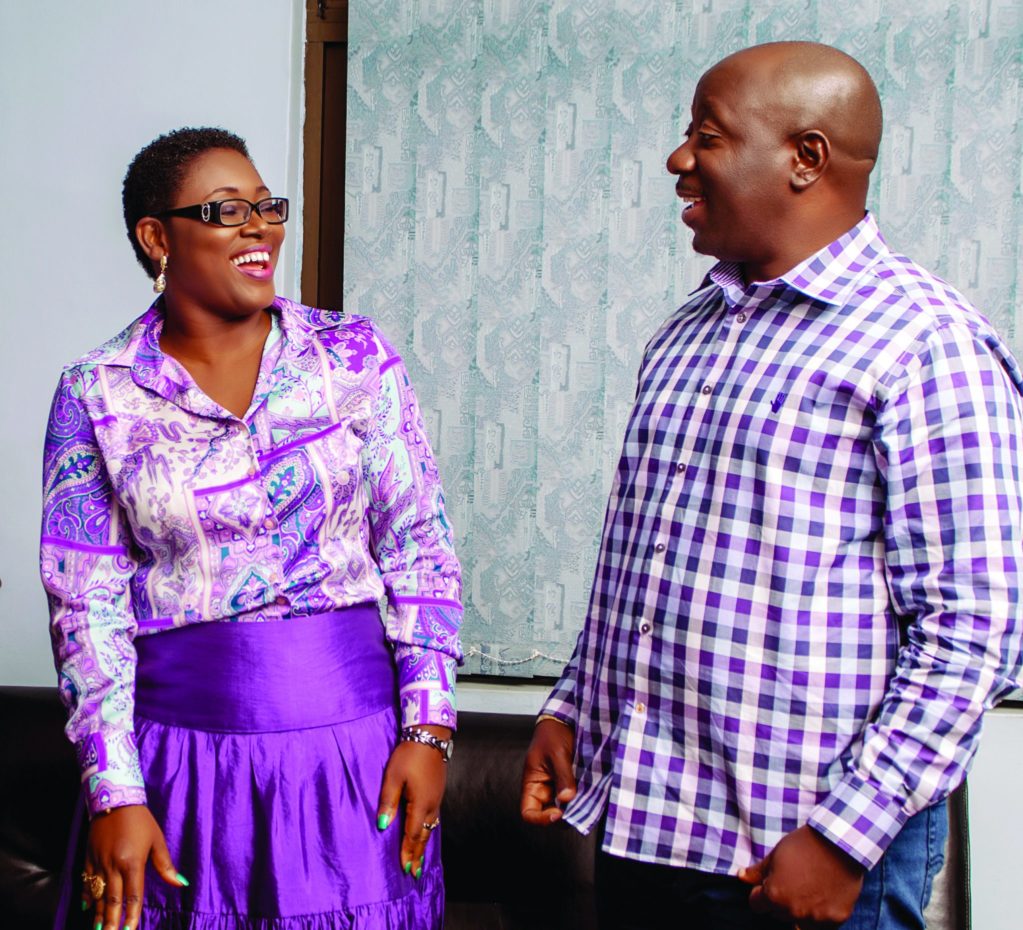They grew up in different worlds: he in a Nigerian palace; she in Accra. Together, through their media group, this multicultural couple proves that inter-African relations are lucrative. An $8,000 investment has multiplied into millions in profits. Now, they have set their sights beyond Ghana.
Theresa and Iyiola Ayoade met in Accra, the Ghanaian capital, 17 years ago. Those were tough times—politically and economically in West Africa—with most of the sub-region under military rule or boiling with civil strife. Today, West Africa is an emerging economic bloc and the Ghanaian-Nigerian couple has found favor, fame and fortune in the land of Ashantes.
Theresa and Iyiola’s alliance began with friendly chit-chat, lunching and discussing business ideas, politics and football; they fell in love and got married. Today, these seasoned entrepreneurs exemplify the geo-political dynamics of their respective homelands.
“I saw a big potential in him. I liked his sense of discipline, his approach to work, the way he applied himself. I saw a lot of promise. Doing business with him was actually a gamble because we were just friends. I don’t think it was just because of love that I got involved with him,” says Theresa.
They make a succesful team.
“She is not a shareholder in the business because she is my wife. I tell you, even if we were not married we would still have been in business together. She made a cash investment and that obviously made me take her more seriously,” he says.
Iyiola left Nigeria for Accra in the early 1990s. He started his business with $8,000, years later. His lucky break came via two companies—Coscharis Automobiles Ghana, the Ghanaian subsidiary of the Nigerian-owned Coscharis Group, and the Agricultural Development Bank of Ghana (ADB).
“I had delved into management consultancy along the way and Coscharis had asked me to give them a market penetration strategy. They liked my plan, and I organized the first auto fair in Ghana in 1997.”
It was while organizing the auto fair that he met Theresa, who was then a marketer at Joy FM radio station, in Accra.
The ADB opportunity, in 1999, required him to present audio-visual content for a campaign. He delivered the winning concept—a television game show, the first of its kind in Ghana—within two days. Soon after, he opened Charterhouse Productions, a television production company and launched the Ghana Music Awards. His staff payroll grew from six to 18. Theresa quit Joy FM in 2000 to join him.
By all accounts, Iyiola, Theresa and their Ghanaian business partner Philip Ayensu, have done well. They have created jobs promoted cross-border business ties and built a multi-million dollar business that straddles the marketing, advertising, entertainment and media sectors in Ghana, Nigeria, Sierra Leone and Liberia.
The trio own Multiple Concepts Group—it includes Multiple Concepts, a marketing company; Charterhouse, an events management and audio-visual production firm founded in 1999; MediaEdge-gsm, a mobile content provider founded in 2006; and GhOne, a television channel launched in 2011.
Their story is one of risk, resilience and taking advantage of opportunities. Their reputation and bank balance are healthy.
“Those guys are involved in almost every event happening in Accra,” says Ben Arthur, a Ghanaian business journalist.
“We do about GHS15 million [$743,000] in revenue per annum averagely, I believe this is large for our industry,” Iyiola says.
The group employed around 120 people by December, and opened another office in Cape Verde earlier this year.
Iyiola was born and raised in Ife, in south western Nigeria.
“I grew up in the palace. My mum was the ninth born of the late king, the Ooni of Ife, Oba Adesoji Aderemi. I had over 500 cousins, so many role models to choose from,” he says.
Among his cousins were lawyers, bankers, accountants, doctors, lecturers, thespians and intellectuals. He studied economics and statistics at the University of Benin, in Nigeria, and worked as an investment and financial analyst in Lagos.
“I came to Ghana with almost nothing. But, at least, I knew I was not going to fail. I had my brains and I was lucky that a few people I’d met in Accra, during my early years in the city, believed in my ideas, my work ethic and my judgment,” he says.
He credits his success to strategic decision making, clients’ goodwill and Ghana’s tranquil environment.
“One thing, I think, I did very well is that I didn’t paint this business green-white-green. A lot of businesses come here from Nigeria and they are so Nigerian. There is market resistance, however subtle, to that kind of thing, but then again, Nigerians are not very easy people to deal with also. The average Ghanaian is somewhat reserved. They are generally peaceful people and it is that peace that gives us the security that we enjoy here.”
He is bullish about Ghana-Nigeria trade and the subject of Africans investing in Africa.
“We have a 250 million market in West Africa and the market is open to everybody, not just Nigerians and Ghanaians. In fact, I really don’t get it when people talk about Nigerian companies coming to Ghana to take away business from the Ghanaians. Then I ask, ‘Excuse me, is Standard Chartered bank a Nigerian company? Is Barclays bank Nigerian? Is Ashante Goldfields Nigerian? Is Goldfields Nigerian?’”
He says that while Ghanaians accept foreign companies doing business in their country, they resist Nigerians.
“Meanwhile, they stand to gain more from Nigerians because we are one of you, our cultural and geographical affinity should be a plus. There is plenty of opportunity for us all to grow and try to unify the West African market. We need to do more [business] between ourselves. That’s the only way we will develop and grow the region.”
Sometimes success comes when you look beyond your borders and team up with your African neighbors.
